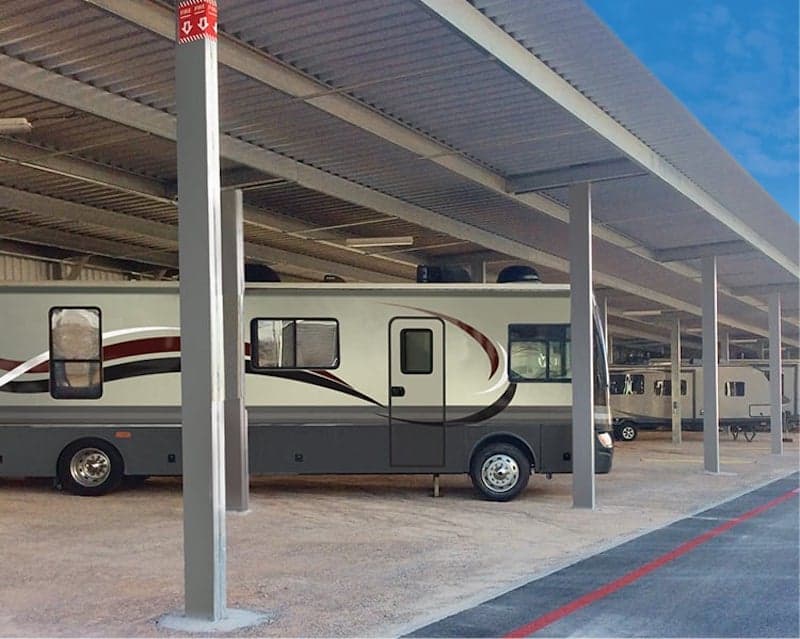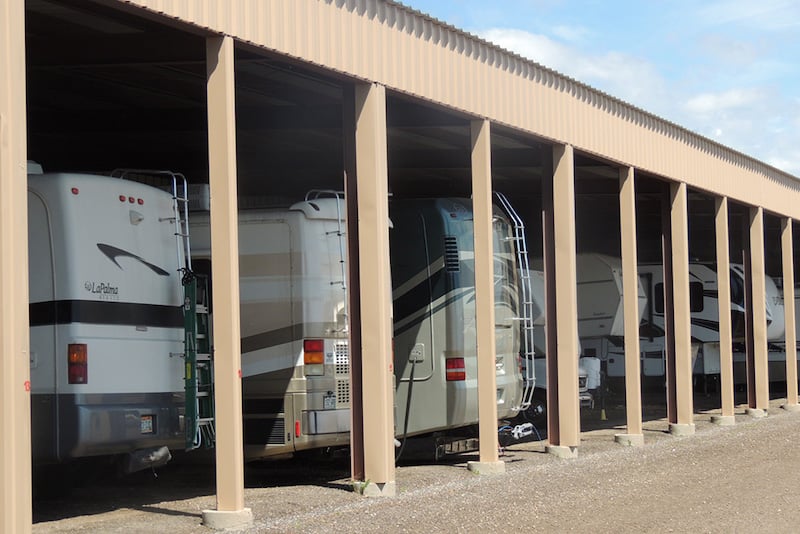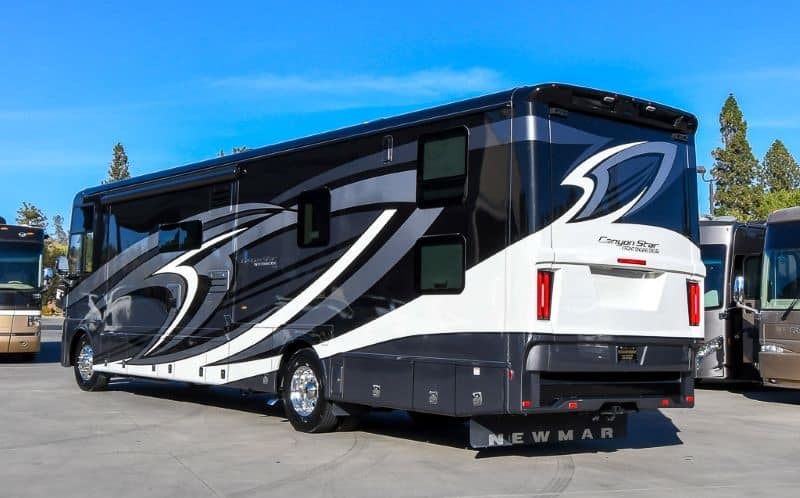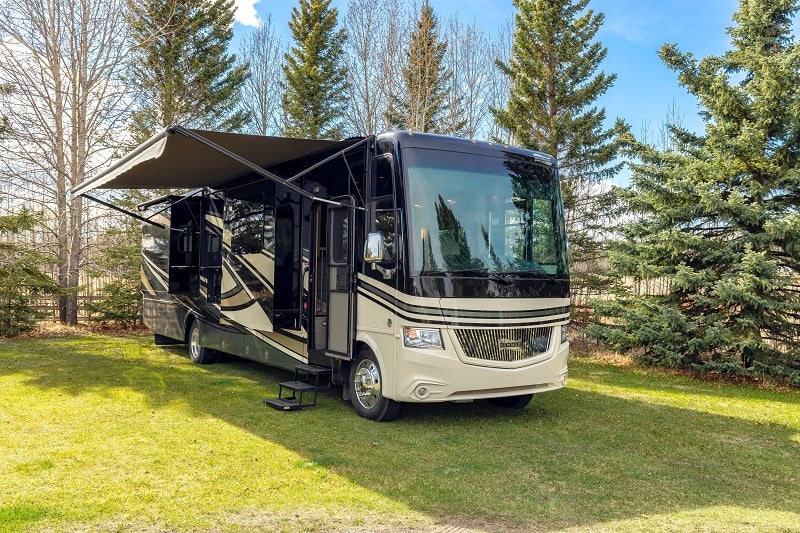Selecting an RV storage facility is a crucial decision requiring careful consideration. This article provides you with 10 essential questions to ask before settling on a choice.
These inquiries will assist you in evaluating the security, cost, accessibility, and other vital aspects of each facility, ensuring your RV’s safe and convenient storage.
So, if you’re an experienced RV owner or a newcomer to the RVing scene, continue reading to make a knowledgeable choice for your RV’s second home.
Should You Use An RV Storage Facility?
Using an RV storage facility is a beneficial choice, especially if you lack sufficient space at home for your RV. It provides a secure and dedicated spot for your vehicle, protecting it from the elements and potential damage.
However, it’s important to remember that it might not just be a great option, but it could be your only option sometimes.
For instance, some residential areas have strict rules against large vehicles like RVs parked on the street or in driveways for extended periods.
Before deciding on using an RV storage facility, consider factors such as cost, location, security measures, and accessibility. It’s also worth asking about any additional services they might offer, such as routine maintenance or cleaning.
4 Advantages Of RV Storage Facilities
RV storage facilities provide lots of value for the monthly cost. For many RVers, RV storage is factored into ownership. For those not sure about RV storage here are some pros to consider.
1. Saves Space at Your Property
One of the most apparent advantages of using an RV storage facility is that it saves space at your home. RVs are typically large and can occupy considerable room in your driveway or yard.
Keeping your RV at a storage facility frees up this space for other uses. You could use the extra room to park additional vehicles, set up a playground for your kids, or even create a beautiful garden.
2. Security is Increased
Security is another significant benefit of an RV storage facility. These facilities often have robust security measures to protect your precious investment.
Security measures include 24/7 surveillance cameras, controlled gate entry, and on-site security staff. So, you can rest easy knowing your RV is safe and sound, even when you’re not around.
3. Snow Removal in the Winter

Another advantage is that an RV storage facility provides easy access to your vehicle during the winter months.
If you take a spontaneous winter road trip, you won’t have to worry about digging your RV out of the snow. The storage facility will ensure your RV is ready whenever you need it.
Plus, storing your RV in a facility during winter can help protect it from harsh weather conditions, potentially saving you money on maintenance and repairs in the long run.
4. RV Services Might Be Available
Some RV storage facilities offer an array of services for your RV. These include RV service and repairs and washing and detailing. Some even offer water and a dump station!
And covered or indoor storage options may be available to help protect your RV from the elements.
We keep our Class A RV at a covered storage facility that has electricity so we can keep the RV plugged in so the batteries stay charged.
3 Disadvantages Of RV Storage Facilities
While an RV storage facility offers several advantages, it’s also essential to consider some potential drawbacks.
1. Inconvenient Location
One possible inconvenience is the distance of the facility from your home. If the storage facility is far away, retrieving and returning your RV could become time-consuming.
This might be fine for those who use their RVs infrequently, but the travel time can add up for regular users.
2. RV Storage Can Be Expensive
Another downside can be the cost associated with using an RV storage facility. Depending on the location, amenities, and level of security, storing your RV at a facility can be a significant monthly expense.
We’ve seen RV storage prices across the country ranging from $100 to $500 per month. This additional cost can be a deterrent for those on a tight budget. It’s always wise to compare prices and services across different facilities for the best value.
3. Limits on Access
Limited access hours can also pose a challenge for some RV owners. Many storage facilities operate on a schedule, meaning you can only access your RV during specific hours.
This limitation could be problematic if you prefer to hit the road early in the morning or if you need to return your RV late at night. Our storage facility required us to call during business hours for a special gate code if we needed to access our RV between 10 p.m. and 6 a.m.
Are RV Storage Facilities Safe?
Yes, RV storage facilities are generally safe. They are designed to protect and secure vehicles, including RVs, from theft and damage.
These facilities often have security measures such as surveillance cameras, gated access, security personnel, and alarm systems to deter potential thieves and vandals.
However, it’s important to remember no place is entirely immune to theft.
Incidents can happen anywhere, even in the most secure locations. Therefore, while these facilities are typically safe, there is always a small risk involved.
You may recall our YouTube video about someone hitting our RV with their truck while it was at our storage facility.
Before choosing a storage facility for your RV, check its security features. Ask about their surveillance system, access controls, and any additional security measures they have in place.
Some facilities also offer insurance or have policies to cover any damages or theft on their property. We highly recommend you check with your insurance agent to make sure you are fully covered while your RV is in the storage facitily.
10 Questions To Ask Before Choosing An RV Storage Facility
Choosing the right RV storage facility can be complex, considering many factors.
To help guide you through this decision, we’ve compiled a list of essential questions you should ask.
These inquiries will ensure you find a facility that meets your needs, offers excellent security, and provides the best care for your vehicle.
Before you make your final choice, arm yourself with these ten critical questions to ask your potential RV storage facility
1. Do You Have 24hr Security?
Security is a paramount concern for any RV storage facility, and most offer around-the-clock surveillance to ensure the safety of your vehicle.
This constant vigilance helps to deter potential theft or vandalism, providing peace of mind for renters.
2. What Type Of Security?
The specific security measures in place can vary between facilities. Most commonly, a comprehensive CCTV system will be in operation, providing video monitoring of the entire site.
Besides cameras, many facilities use access control systems, such as coded entry gates, to restrict unauthorized access.
On-site security personnel may also be present at certain facilities, particularly during non-business hours or peak times. Security dogs are less common but can be found at some sites.
3. What Are The Access Hours?
Access hours can differ significantly among facilities. Some storage sites offer 24/7 access, allowing renters the flexibility to retrieve or park their RV at any time.
Others may have more restricted hours, typically aligning with standard business or daylight hours. Clarifying the access hours with the facility is essential to ensure it suits your needs.
4. How Do You Charge?
Pricing structures can vary, but most RV storage facilities charge based on the size of your vehicle, precisely its length, measured per foot.
Other factors that could influence cost include:
- The type of storage (indoor or outdoor).
- The location of the facility.
- Any additional amenities or services provided, such as electric hookups or dump stations.
5. Have They Had Any Theft Issues?
While all storage facilities strive to provide secure environments, incidents can occur.
It’s advisable to ask directly about any past theft incidents at the facility.
Knowing their history and how they responded to such incidents can provide insight into their commitment to security and ability to handle such situations effectively.
In addition to discussing this with the manager, you can also call the local police and ask if they know of any thefts, vandalism, or break-ins at the storage facility you are considering.
6. What Are Your Liabilities?
Liability policies can differ significantly between facilities. Some may accept responsibility for damages caused by their staff or other renters, while others may require you to have your insurance coverage.
Before entering a rental agreement, understanding the facility’s policies and procedures regarding accidents or damages is crucial.
In some cases, storage facilities may require proof of insurance to enter into a contract. Regardless if it’s required or not having insurance on your RV is a good idea
7. Do They Do Snow Removal To Allow Year-Round Access?

In regions that experience significant snowfall, many RV storage facilities provide snow removal services to maintain access throughout the year.
This can be important if you need regular access to your vehicle during the winter months. However, offerings can vary, so confirming this with each facility is best.
8. What Hours Are The Staff Able To Be Contacted?
Staff availability varies from facility to facility. Some may have personnel on-site or available by phone during regular business hours, while others might offer 24/7 contact options.
Knowing who to call and when they are available is important, especially in case of emergencies or urgent issues.
9. Do They Require ID From All Renters?
For security, most storage facilities require valid identification from all renters.
Not only does this prevent fraudulent rentals, but it also ensures a secure environment for all users. Always have your ID ready when signing up for a storage space.
10. Are There Long-Term Discounts?
Some RV storage facilities offer discounts for long-term rentals. These incentives can make it more affordable for those planning to store their RV for an extended period.
The specifics of these discounts can vary, from a percentage off the monthly rate to a set amount off the total cost when paying for several months upfront.
Always inquire about potential discounts when considering a facility.
Can You Park Your RV In Your Driveway?
We are lucky because we don’t live in a community with an HOA. This allows us to park our Class C RV right in our driveway. But, our Class A RV is too big so we store it at a nearby storage facility.
But, parking an RV in your driveway depends on a few factors, including local laws, Homeowners Association (HOA) rules, the size of your vehicle and driveway, and neighborhood sentiment.
In many neighborhoods, bylaws or local ordinances dictate whether you can park an RV in your driveway.
Some localities completely restrict RV parking, while others may have specific regulations regarding the vehicle size, parking duration, or location on your property.
HOA rules are another critical consideration. If you live in a community with an HOA, there may be specific rules prohibiting or limiting RV parking in driveways. Researching these rules before parking your RV at home is crucial to avoid potential fines or disputes.
The physical limitations of your property also matter. Your driveway must be large enough to accommodate your RV without obstructing sidewalks or roadways.
The weight of an RV could damage some types of driveways, particularly those made of asphalt or pavers.
Finally, consider the impact on your neighbors.
Even if it’s legal and feasible to park your RV in your driveway, doing so might not sit well with your neighbors because of concerns about aesthetics, property values, or safety.
Do RV Storage Facilities Allow You To Do Repairs?
Whether RV storage facilities allow repairs depends on each facility’s specific rules and regulations. These rules can vary significantly, with some facilities allowing minor maintenance and others prohibiting repair work.
Most RV storage areas do not permit more extensive repair, such as painting or welding. These activities can pose safety risks, create noise and odors, and potentially damage the facility or other stored vehicles.
However, facilities may allow some routine maintenance tasks. For example, many facilities permit winterizing and de-winterizing processes.
Winterizing involves preparing the RV for cold weather storage, while de-winterizing prepares it for warmer weather. Some facilities may require these processes to be performed by a particular company or certified professional.
Sometimes, temporary and minor repairs might be allowed, provided they don’t disrupt the facility or other users. These could include tasks like changing a tire or replacing a battery.
Always check with the facility’s management before undertaking any repair or maintenance work on your RV while it’s in storage.
Understanding and following the facility’s rules is essential to avoid potential fines, eviction, or even legal action.
Final Thoughts About Choosing An RV Storage Facility

RV storage facilities can be an excellent solution for individuals looking for a secure place to store their recreational vehicles when they’re not in use.
They offer a range of options, from open-air parking spaces to fully enclosed storage units catering to different needs and budgets.
However, it’s essential to do thorough research before choosing a facility.
Consider the security measures, access hours, staff availability, and pricing. Ask about a history of theft or damage incidents and understand the facility’s liability policies.
RV storage facilities can provide great value and peace of mind for RV owners.
But like any service, it’s crucial to understand what you’re getting into and ensure the facility meets your specific needs and expectations.
Related Reading:
– When To Turn On Your RV Tank Heaters?
– Cat Strap: The Best RV Catalytic Converter Theft Prevention
– Why Does My RV Furnace Blow Cold Air?
– 21 Tips To Secure An RV During A Hurricane
About the Author:

Mike Scarpignato is an avid RVer and outdoorsman. He travels with his wife Susan in their Class A 2021 Thor Challenger and their Class C 2008 Gulf Stream Conquest. Mike is also the owner of RVBlogger.com, TravelTrailerPro.com, and RV Camping Magazine.



